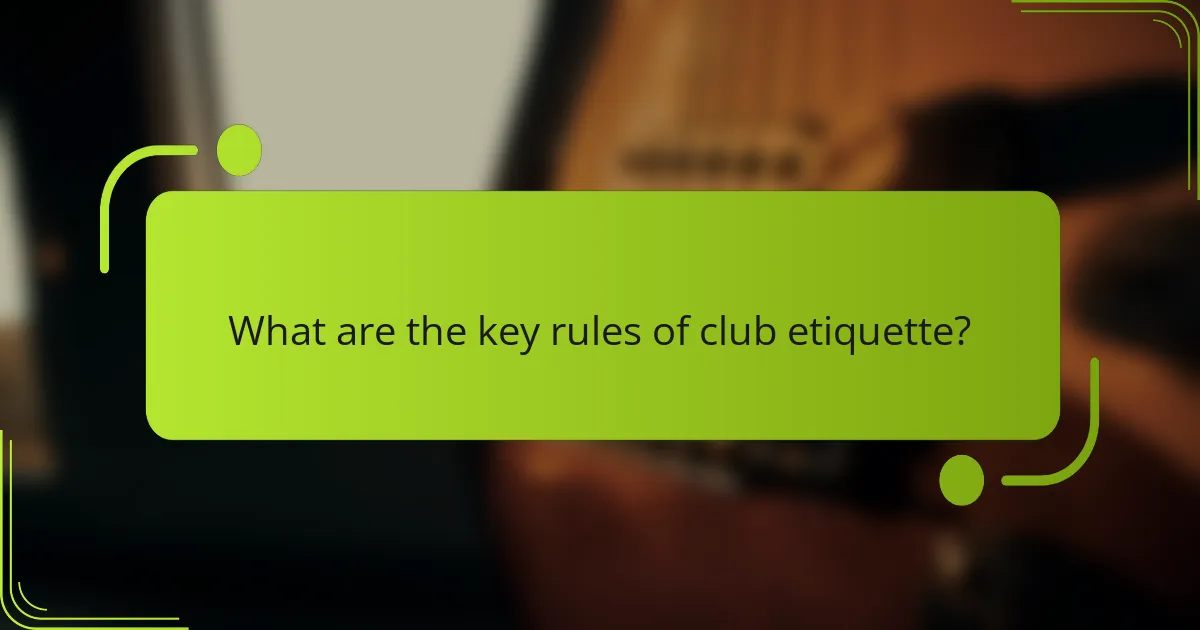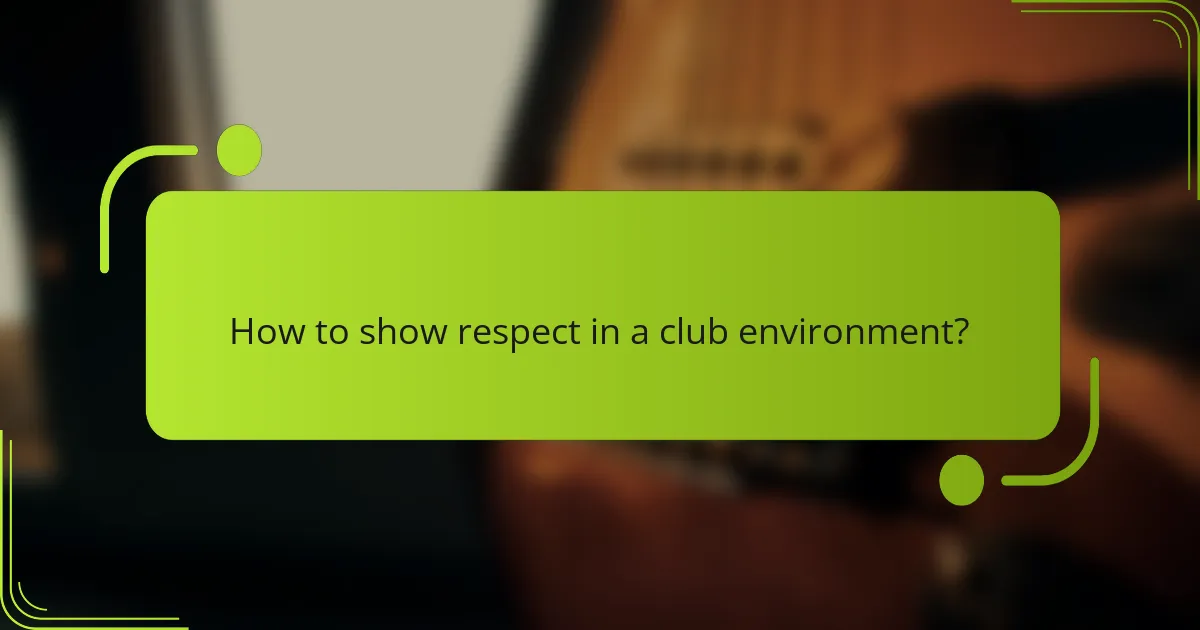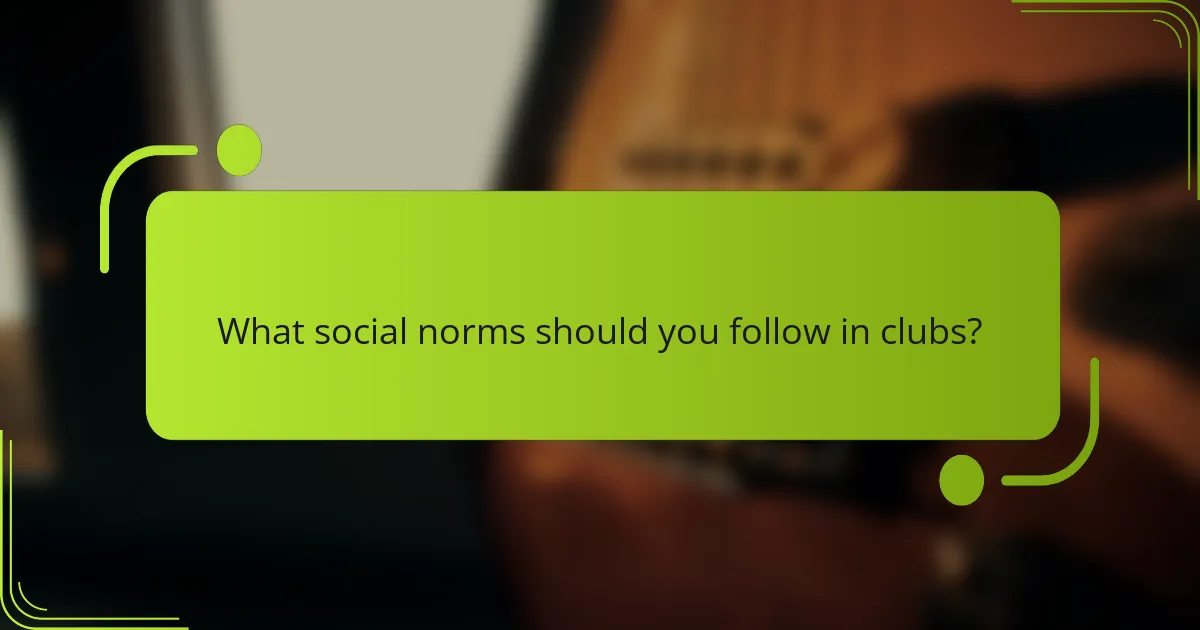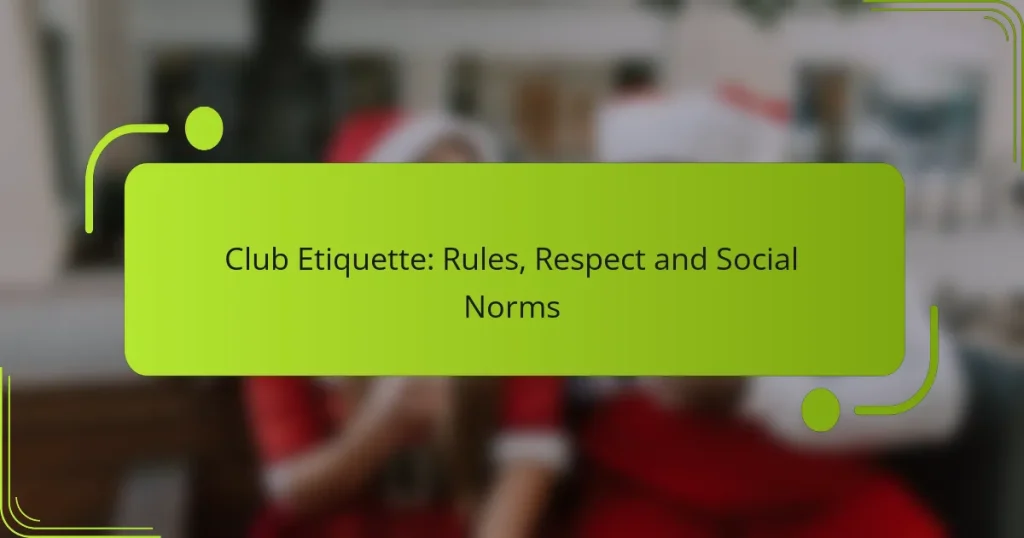Club etiquette is essential for creating a respectful and enjoyable environment for all members. By understanding and adhering to the key rules and social norms, individuals contribute to a welcoming atmosphere that enhances everyone’s experience. Respectful behavior, consideration for others, and compliance with club policies are fundamental to fostering positive interactions within the club setting.

What are the key rules of club etiquette?
The key rules of club etiquette focus on respect, consideration, and adherence to the club’s policies. Following these guidelines ensures a pleasant experience for everyone involved, fostering a welcoming atmosphere.
Respect personal space
Respecting personal space is crucial in any social setting, especially in clubs where people gather closely. Maintain a comfortable distance from others to avoid making them feel crowded or uncomfortable.
Be aware of your surroundings and the body language of those around you. If someone seems to be pulling away or appears uncomfortable, adjust your proximity accordingly.
Dress appropriately
Dressing appropriately for a club is essential to fit in and show respect for the venue and its patrons. Many clubs have specific dress codes, ranging from casual to formal, so check the guidelines before attending.
Common dress expectations include avoiding overly casual attire like flip-flops or gym wear in upscale venues. Instead, opt for smart casual or stylish outfits that align with the club’s atmosphere.
Be mindful of noise levels
Being mindful of noise levels is important for maintaining a pleasant environment. While clubs are often loud, it’s essential to keep your voice at a reasonable volume to avoid disturbing others.
If you’re in a quieter area or near those who are conversing, lower your voice. Consider stepping away from crowded spaces if you need to speak loudly or have a more animated conversation.
Follow the club’s entry policies
Following the club’s entry policies is vital for a smooth experience. Many clubs require ID checks, cover charges, or specific dress codes to ensure a safe and enjoyable atmosphere.
Be prepared to show valid identification and pay any necessary fees upon arrival. Familiarize yourself with the club’s rules regarding age restrictions and guest lists to avoid any surprises at the door.

How to show respect in a club environment?
Showing respect in a club environment involves understanding and adhering to social norms that foster a positive atmosphere for everyone. This includes being mindful of your behavior, acknowledging others, and contributing to a respectful space.
Practice active listening
Active listening is crucial in a club setting, especially when engaging in conversations. Focus on the speaker, maintain eye contact, and respond appropriately to show that you value their input. This enhances communication and builds rapport with others.
To practice active listening, avoid interrupting and allow others to express their thoughts fully. Nod or provide verbal affirmations to indicate your engagement. This not only demonstrates respect but also encourages a more meaningful exchange of ideas.
Acknowledge staff and performers
Recognizing the efforts of club staff and performers is essential for maintaining a respectful environment. A simple thank you or a compliment can go a long way in showing appreciation for their hard work. This fosters a positive relationship between patrons and those who contribute to the club experience.
Consider tipping staff appropriately for their service, as this is a common practice in many countries. For performers, clapping or cheering after a performance shows your support and respect for their talent and effort.
Be courteous to fellow patrons
Being courteous to fellow patrons enhances the overall club experience. This includes respecting personal space, avoiding loud or disruptive behavior, and being mindful of your surroundings. Simple gestures like saying “excuse me” when passing by can make a significant difference.
Additionally, if you notice someone who seems uncomfortable or isolated, a friendly smile or a brief conversation can help create a more inclusive atmosphere. Remember that everyone is there to enjoy themselves, so maintaining a respectful demeanor is key.

What social norms should you follow in clubs?
In clubs, social norms revolve around respect, communication, and understanding the environment. Adhering to these norms enhances the experience for everyone and fosters a positive atmosphere.
Understand tipping etiquette
Tipping is a crucial part of club culture, especially in countries like the United States where service staff rely on tips for a significant portion of their income. A common guideline is to tip around 15-20% of your total bar tab, but you can adjust this based on the quality of service.
When ordering drinks, consider tipping a dollar or two per drink, particularly if the bartender is busy or goes out of their way to serve you. Always check if gratuity is included in your bill, especially in upscale venues.
Know when to dance or socialize
Understanding when to dance and when to socialize is key to enjoying your club experience. If the dance floor is lively and the music is upbeat, it’s generally a good time to hit the floor and join in the fun.
Conversely, during slower moments or when the music shifts to a more relaxed vibe, engaging in conversation with friends or meeting new people is appropriate. Pay attention to the crowd’s energy to gauge the right moments for each activity.
Respect the club’s music and vibe
Each club has its unique music style and atmosphere, which should be respected. If the venue is known for electronic music, refrain from requesting songs that clash with the established vibe, as this can disrupt the experience for others.
Be mindful of your volume when talking, especially in quieter settings. If the music is loud, consider stepping away from the dance floor to converse without disturbing others. Adapting to the club’s ambiance enhances your enjoyment and shows respect for fellow patrons.

How do cultural differences affect club etiquette?
Cultural differences significantly influence club etiquette, shaping expectations around behavior, dress, and social interactions. Understanding these variations is essential for respectful participation in diverse club environments.
Variations in dress codes
Dress codes can vary widely between clubs in different cultures. In some regions, formal attire is expected, while others may embrace casual or even eclectic styles. For instance, upscale clubs in major cities often require smart casual or formal wear, while beach clubs may allow swimwear and flip-flops.
When attending a club, it’s wise to research the specific dress code beforehand. A quick check on the club’s website or social media can provide guidance on acceptable attire, helping you avoid any faux pas.
Differing attitudes toward alcohol
Attitudes toward alcohol consumption can differ significantly across cultures, impacting club etiquette. In some societies, drinking is a central part of socializing, while in others, it may be frowned upon or restricted. For example, clubs in Western countries might have a vibrant nightlife centered around alcohol, whereas clubs in more conservative regions may have limited drink options or promote non-alcoholic beverages.
Understanding these differences can enhance your experience. If you’re in a culture where alcohol is less accepted, consider opting for soft drinks or engaging in activities that don’t revolve around drinking.
Respect for local customs
Respecting local customs is crucial when navigating club etiquette in different cultures. This includes understanding social norms, such as greeting practices, personal space, and noise levels. For example, in some cultures, it’s customary to greet everyone with a handshake or kiss, while in others, a simple nod may suffice.
To ensure a positive experience, observe how locals behave and follow their lead. Avoid loud conversations or disruptive behavior in quieter settings, and always be mindful of cultural sensitivities to foster a respectful atmosphere.

What are common mistakes to avoid in clubs?
Common mistakes in clubs often stem from a lack of awareness about social norms and respect for others. Avoiding these pitfalls can enhance your experience and that of those around you.
Disregarding personal boundaries
Disregarding personal boundaries can lead to discomfort and conflict in club settings. It’s essential to recognize and respect the physical and emotional space of others, as everyone has different comfort levels.
When interacting with others, pay attention to their body language and verbal cues. If someone steps back or seems uninterested, it’s a clear sign to give them space. For example, if you’re dancing, ensure you’re not invading someone else’s personal area without consent.
To maintain a respectful atmosphere, consider establishing clear boundaries for yourself as well. Communicate openly if you feel uncomfortable, and encourage others to do the same. This mutual respect fosters a more enjoyable environment for everyone involved.


